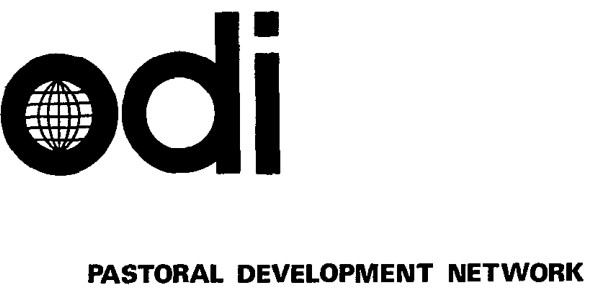Location
The Pastoral Development Network represents a world-wide network of researchers, administrators and extension personnel interested in the issues of pastoralism and rangelands. Between 1976 and 1996 the PDN was managed by ODI and published regular mailings including newsletters and a wide ranging series of papers on pastoralism and related issues. There were also a number of other related publications.
Members:
Resources
Displaying 26 - 30 of 33An overview of drought strategies and land use in African pastoral systems
This article synthesises findings on various topics relating to drought strategies and land use in African pastoral systems. These include:an exploration of the ecology of african rangelandsan investigation into pastoral strategies for mitigation of droughta look at the importance of opportunistic behavior and mobility as a strategy for pastoralistsan exploration of the factors contributing to a gradual breakdown of nomadism.
Limiting livestock pressure on public rangeland in Niger
The present paper is based on a participatory survey carried out in order to establish baseline information on a little known livestock production system and its role in local ecology and economy.The study is based on research in El Kala National Park (North East Algeria).This paper draws attention to some of the problems that arise in understanding the cost and benefit flows in pastoralist systems.
The decline of common property resources in Rajasthan, India
This paper examines the decline of common property resources in the arid zone of Rajasthan in India and the factors underlying the decline.The article concludes that:well-intentioned public programmes like land reformcan deprive a region of its comparative advantage in a key economic activity (in this case livestock farming)privatisation raises the cost of livestock raising and, hence, erodes the the region's comparative advantagethe continuing shrinkage and degradation of common property resources is likely to force further reduction in the size of livestock holdings and changes in their c
Land tenure constraints associated with some recent experiments to bring formal education to nomadic Fulani in Nigeria
This paper is based on a series of studies conducted by the author on the settlement problems, work roles and educational experiments among nomadic Fulani in Plateau, Bauchi and Kaduna States, Nigeria, from 1982 to 1984.The first part of this paper describes the land tenure system in northern Nigeria and the way in which it affects pastoral nomads and plans for their settlement. The second part discusses the Nigerian Government;s intention to educate nomads and gives the example of special schemes which have attempted to do this.
Settlement schemes for herders in the sub humid tropics of West Africa: issues of land rights and ethnicity
Attempts at settling or sedentarizing nomadic herders in semi-arid and arid regions have been largely unsuccessful, partly on account of the difficulty of restricting the movements of domestic livestock in areas where low and irregular rainfall lead to scant and unreliable sources of water and grazing. But for the herders in sub-humid regions, where both water and vegetation resources are much more reliable and substantial, there appear to be different possibilities.



